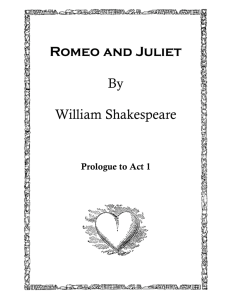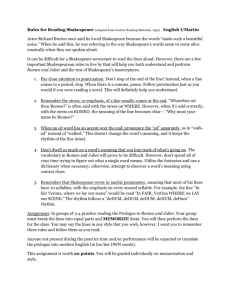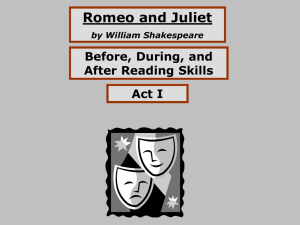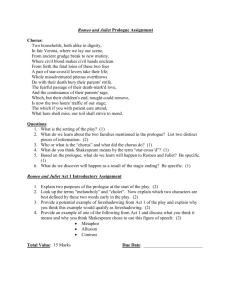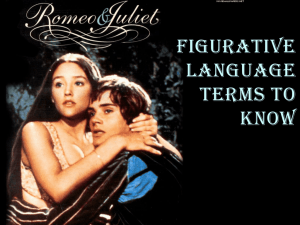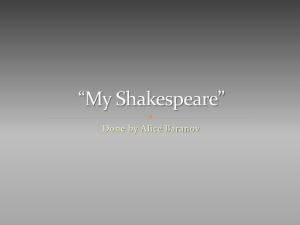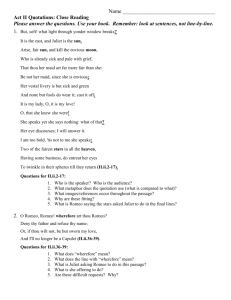Romeo and Juliet by William Shakespeare Before, During, and After
advertisement
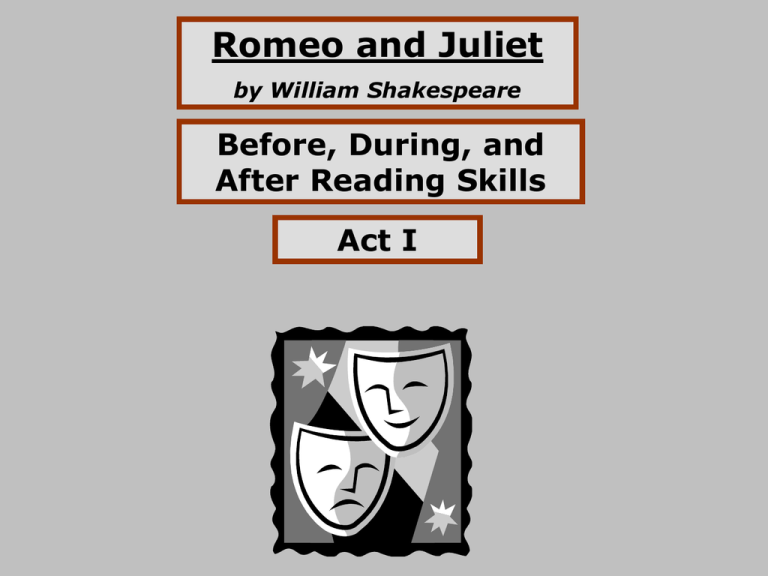
Romeo and Juliet by William Shakespeare Before, During, and After Reading Skills Act I Literary Response Romeo and Juliet Act I Scenes 1&2 Read the play carefully and note the way the characters interact with each other and the reasons behind their actions. Which character played the most important role in the first two scenes? What did he/she do that you thought was so important? Explain your thoughts and ideas and use evidence from the text to support your response. Before Reading Skills Preview and Predictions •Examine the text features located throughout the first two scenes. (pages 806-821) •Make a list of the things you “know” or “think you know” based only on the text features. •Make a list of at least 3 things you want to know, but you need to read in order to find out. •What genre or type of text do you think we are reading? Why? During Reading Skills Structure and Purpose of a Drama •The purpose of a drama is to entertain the audience and to present information/details about the characters. •The audience will learn about the characters in several ways. Pay attention to the characters and try to keep them organized as you read. •You will be asked to create a character chart to identify the characters and their character traits. How do we learn about a character during a play? •What the characters say •What the characters do •What other characters say about them •How other characters treat them Comprehension/Discussion Questions Prologue page 807 1. Read the prologue and examine what information the author shares with us at the beginning of the play. 2. How is this information given to the audience? 3. Use your poetry skills to analyze the meaning of the prologue. 4. Translate the information into prose. 5. What questions do you have after reading the prologue? Act I Scene 1 808-809 A. Analyzing Cause and Effect – What causes the Capulet servants Sampson and Gregory to draw their weapons? ??? B. Making Inferences – What can you infer about Sampson’s and Gregory’s character based on these speeches? ??? C. Analyzing Cause and Effect – What causes Gregory’s behavior toward the Montague servants to change? ??? Pages 810-817 Read the rest of the scene and respond to questions D-P on your own paper. The Language of Shakespeare How is the language of Shakespeare’s Romeo and Juliet different from the language we use? Identify the differences. Translate Shakespeare’s words into modern language. Explain the meaning of important lines from Romeo and Juliet. Gregory to Sampson To move is to stir, and to be valiant is to stand. Therefore, if thou art moved, thou run’st away. Tybalt to Benvolio What, art thou drawn among these heartless hinds? Turn thee, Benvolio; look upon thy death. Montague Thou villain Capulet! – Hold me not; let me go. Lady Montague Thou shalt not stir one foot to seek a foe. Romeo to Mercutio Is love a tender thing? It is too rough, Too rude, too boist’rous, and it pricks like a thorn Romeo to Mercutio Peace, peace, Mercutio, peace! Thou talk’st of nothing. Nurse to Juliet Peace, I have done. God mark thee to his grace! Thou wast the prettiest babe that e’er I nursed. And I might live to see thee married once, I have my wish. Lady Capulet to Nurse I have rememb’red me; thou’s hear our counsel. Thou knowest my daughter’s of a pretty age. Your Favorite Lines Select a total of four lines from Act I that you thought were important, interesting, funny, or odd. Copy the lines, page(s), and character(s) involved. Translate any words or phrases that need to be clarified. Explain the meaning of the lines and what was happening in the play as the lines were being spoken.
